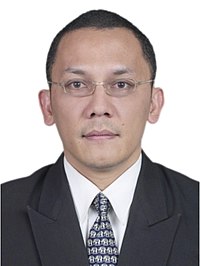|
Laksana Tri Handoko
Laksana Tri Handoko (born 7 May 1968, in Malang) is an Indonesian scientist and public official specializing in theoretical and particle physics. He formerly served as the deputy head of science and technology for the Indonesian Institute of Sciences (Indonesian: Lembaga Ilmu Pengetahuan Indonesia, LIPI) from 2014 to 2018.[1][2] In 2018, he replaced Bambang Subiyanto as the acting chairman of the institute.[3] He has been the Chairman of the National Research and Innovation Agency (Indonesian: Badan Riset dan Inovasi Nasional, BRIN) since 28 April 2021.[4] Early life and educationHandoko born to Suyono and Susasi. His father was a physics lecturer at Gadjah Mada University and a part-time chicken farmer together with his mother.[5][6] At that period, the physics lecturer did not earn adequate paychecks due to limited opportunities and salaries in Indonesia at that time, resulting in his father having a side job as a chicken farmer.[6] Through chicken farming, his parents educated him on professionalism and hard work early in his youth.[5] Despite his background, Handoko's love of physics and his love for physics bring him to the Bandung Institute of Technology for undergraduate study in physics.[5] However, when Habibie opened the Overseas Fellowship Program scholarship, he became an awardee and resigned from Bandung Institute of Technology.[5] He completed his undergraduate study at Kumamoto University,[2] and then his graduate study in particle physics at Hiroshima University.[7][8][9] Between his time of undergraduate graduation and master's study, he worked at a Japanese wood factory and later became a gas station employee in Japan.[5] He became a fellow of the Alexander von Humboldt Foundation in 1999,[10][11] and he's also the secretary of the Humboldt Alumni Association of Indonesia.[12] CareersLIPI ScientistAfter returning to Indonesia, Handoko joined LIPI. In LIPI, he joined the Theoretical Physics group. In 2002, he later became Head of the LIPI Theoretical Physics Group, a post he held for 10 years. In 2012, he became Head of the LIPI Research Center for Informatics. He rose to the rank of Deputy III (Engineering Sciences) of LIPI from 2014 until 2018.[13] EducatorDuring this time as a LIPI scientist, he was appointed as a visiting professor at the Department of Physics Bogor Agricultural Institute (2002–2004) and the Department of Physics University of Indonesia (since 2002).[14] At the time of his appointment as Chairman of BRIN, he still holds the visiting professor position at the University of Indonesia.[15] Chairman of LIPIHe became the 10th Chairman of LIPI in 2018, succeeding Iskandar Zulkarnaen, the 9th Chairman of LIPI. Previously, the post was filled in an acting capacity by Bambang Subiyanto in the transition period between Zulkarnaen to Handoko.[14] He was the penultimate chairman of LIPI. Chairman of BRINOn the second reshuffle of the Onward Indonesia cabinet that was announced on 28 April 2021, he was appointed as the second (but first independent) holder of Chairman of BRIN.[16] After liquidation of Indonesian Institute of Sciences (Indonesian: Lembaga Ilmu Pengetahuan Indonesia, LIPI), Agency for the Assessment and Application of Technology (Indonesian: Badan Pengkajian dan Penerapan Teknologi, BPPT), National Nuclear Energy Agency of Indonesia (Indonesian: Badan Tenaga Nuklir Nasional, BATAN), and National Institute of Aeronautics and Space (Indonesian: Lembaga Penerbangan dan Antariksa Nasional, LAPAN) into BRIN on 1 September 2021, he currently become the Head of BRIN in its first consolidated form.[4] Honors and awardsScholarships and Fellowships
AwardsAs a LIPI scientist, he was awarded by:[17]
As Chairman of BRIN, he was awarded The Chinese Government's Friendship Award by the Government of China. In his citation, he is credited with organizing collaborations in the field of nuclear and space research between Indonesia and China. The award was presented by the Chinese Ambassador to Indonesia, Lu Kang on 26 April 2022.[18][19][20] ControversiesAs Chairman of LIPI, he was seen as "revolutionary" by implementing revolutionary policies for LIPI reorganization. The most important revolutionary policy during his time were the reorganization of LIPI, which at time the size is very big due to having many non-optimal subunits into slimmer organization and archiving revolution. Due to his revolutionary policies, he was protested by his seniors at LIPI.[21] His leadership style as leader of BRIN seen as "one man show leadership" and lack of compromising criticized and protested by his seniors and former colleagues.[22] He was also become the center of polemic due to human resource issue resulted on Eijkman Institute of Molecular Biology liquidation in early 2022.[23] References
|
||||||||||||||||||||||||||||||||||||||
Portal di Ensiklopedia Dunia

